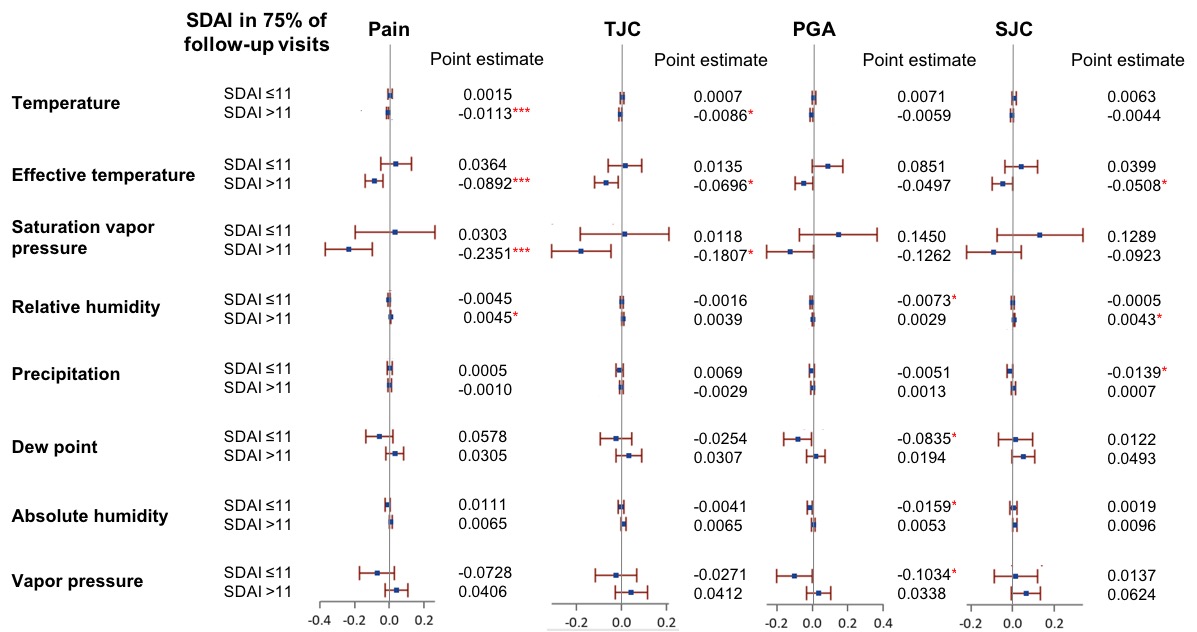Session Information
Date: Tuesday, November 9, 2021
Title: Abstracts: Patient Outcomes, Preferences, & Attitudes (1909–1914)
Session Type: Abstract Session
Session Time: 2:45PM-3:00PM
Background/Purpose: The notion that weather conditions may influence the symptoms and course of rheumatic and musculoskeletal diseases goes back to ancient times. We aimed to evaluate whether meteorological variables influence disease activity in patients with rheumatoid arthritis (RA).
Methods: We assessed the correlation between individual meteorological variables: temperature, effective temperature, saturation vapor pressure, absolute humidity, relative humidity, dew point, precipitation and clinical measures of disease activity: simplified disease activity index (SDAI), self-reported pain, patient’s global assessment (PGA), 28 tender joint count (TJC) and 28 swollen joint count (SJC). Assessments documented in the Care for RA database were matched with weather variables on a daily basis for a period of 12 years between 2005 and 2017, and analyzed using generalized estimating equations (longitudinal data analysis). Patients with < 5 visits in the study period, those with < 1 visit/quarter or with pain=0 in ≥3 consecutive visits and those living outside of the catchment area were excluded.
Patients were grouped into low (≤11) vs. moderate/high ( >11) disease activity based on SDAI, and additionally considering only subsequent outpatient visits ( >3 visits) where the therapy was stable ( >6 months). On this basis three treatment groups were established: patients taking (1) methotrexate, (2) csDMARD or (3) bDMARD in mono- or combination therapy respectively.
Results: A total of 461 patients with an average disease duration at first visit of 5.7±7.4 years, age of 55.3±14.5 years, mean SDAI: 22.1±12.7 were analyzed. Among patients with moderate/high disease activity, higher temperature/effective temperature and saturation vapor pressure were associated with lower pain and TJC. On the contrary, higher relative humidity was associated with higher pain and higher SJC. Among patients with low disease activity higher relative humidity, absolute humidity, vapor pressure or dew point were associated with lower PGA. Higher precipitation was associated with lower SJC in the low disease activity group (Figure 1). When analysed according to stable treatment period, patients treated with csDMARD in mono- or combination therapy showed the same association between higher average daily temperature/effective temperature or saturation vapor pressure and lower pain as seen in patients with moderate/high disease activity (Figure 2).
Conclusion: In this largest association study of meteorological parameters with RA, both temperature and humidity were shown to have significant effects on pain, TJC and SJC, while PGA was mostly influenced by humidity. Weather had different effects depending on RA disease activity.
 Figure 1. Association of meteorological variables and clinical measures of disease activity. PGA: patient’s global assessment; SDAI: simplified disease activity index; SJC: swollen joint count; TJC: tender joint count; * p≤ 0.05, ** p≤ 0.01, *** p≤ 0.001.
Figure 1. Association of meteorological variables and clinical measures of disease activity. PGA: patient’s global assessment; SDAI: simplified disease activity index; SJC: swollen joint count; TJC: tender joint count; * p≤ 0.05, ** p≤ 0.01, *** p≤ 0.001.
 Figure 2. Association of meteorological variables and clinical measures of disease activity in stable therapy periods. csDMARD: conventional synthetic disease modifying anti-rheumatic drug; MTX: methotrexate; PGA: patient’s global assessment; SDAI: simplified disease activity index; SJC: swollen joint count; TJC: tender joint count; * p≤ 0.05, ** p≤ 0.01, *** p≤ 0.001.
Figure 2. Association of meteorological variables and clinical measures of disease activity in stable therapy periods. csDMARD: conventional synthetic disease modifying anti-rheumatic drug; MTX: methotrexate; PGA: patient’s global assessment; SDAI: simplified disease activity index; SJC: swollen joint count; TJC: tender joint count; * p≤ 0.05, ** p≤ 0.01, *** p≤ 0.001.
To cite this abstract in AMA style:
Mandl P, Studenic P, Alasti F, Kaltenberger R, Kerschbaumer A, Krennert T, Smolen J, Aletaha D. Meteorological Variables Have Different Effect on Core Measures of Disease Activity in Patients with Rheumatoid Arthritis [abstract]. Arthritis Rheumatol. 2021; 73 (suppl 9). https://acrabstracts.org/abstract/meteorological-variables-have-different-effect-on-core-measures-of-disease-activity-in-patients-with-rheumatoid-arthritis/. Accessed .« Back to ACR Convergence 2021
ACR Meeting Abstracts - https://acrabstracts.org/abstract/meteorological-variables-have-different-effect-on-core-measures-of-disease-activity-in-patients-with-rheumatoid-arthritis/
